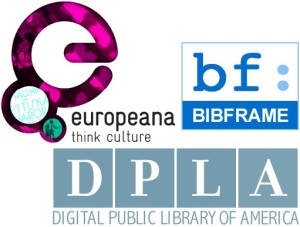Three recent projects demonstrate a move towards greater institutional convergence, data openness and read-write culture. First, Europeana launched in 2008 as Europe’s response to Google Books and provides access to 30 million records from 2,300 European cultural institutions. Second, the Digital Public Library of America — launched in 2013 — provides access to 7,000,000+ items from American cultural institutions. Both of these organizations make accessible the metadata records of digital objects through their portals, while the digital objects themselves remain in the online repositories of partner institutions. The third project, BIBFRAME — released by the Library of Congress in 2012 — provides a Linked Open Data framework for bibliographic description. When properly instituted, BIBFRAME will increase the access to information within library catalogs and connect it to information across other memory institutions. We discuss these initiatives in detail, making clear their contextual backgrounds and objectives, and comparing the common challenges they face as well as opportunities for the future.

